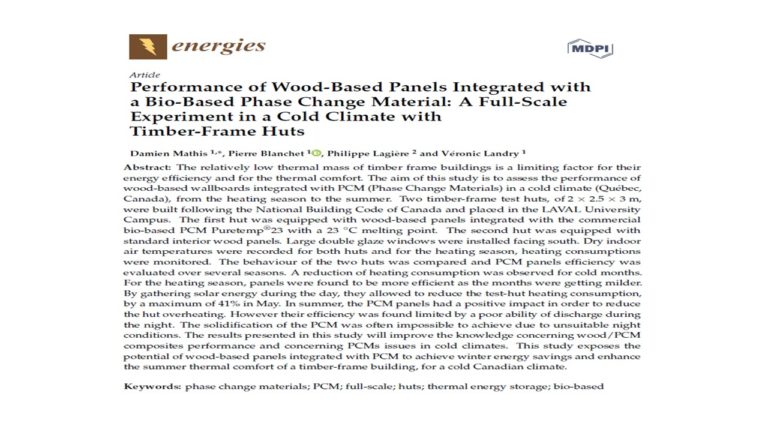Abstract
The relatively low thermal mass of timber frame buildings is a limiting factor for their energy efficiency and for the thermal comfort. The aim of this study is to assess the performance of wood-based wallboards integrated with PCM (Phase Change Materials) in a cold climate (Québec, Canada), from the heating season to the summer. Two timber-frame test huts, of 2 × 2.5 × 3 m, were built following the National Building Code of Canada and placed in the LAVAL University Campus. The first hut was equipped with wood-based panels integrated with the commercial bio-based PCM Puretemp®23 with a 23 °C melting point. The second hut was equipped with standard interior wood panels. Large double glaze windows were installed facing south. Dry indoor air temperatures were recorded for both huts and for the heating season, heating consumptions were monitored. The behaviour of the two huts was compared and PCM panels efficiency was evaluated over several seasons. A reduction of heating consumption was observed for cold months. For the heating season, panels were found to be more efficient as the months were getting milder. By gathering solar energy during the day, they allowed to reduce the test-hut heating consumption, by a maximum of 41% in May. In summer, the PCM panels had a positive impact in order to reduce the hut overheating. However their efficiency was found limited by a poor ability of discharge during the night. The solidification of the PCM was often impossible to achieve due to unsuitable night conditions. The results presented in this study will improve the knowledge concerning wood/PCM composites performance and concerning PCMs issues in cold climates. This study exposes the potential of wood-based panels integrated with PCM to achieve winter energy savings and enhance the summer thermal comfort of a timber-frame building, for a cold Canadian climate.


